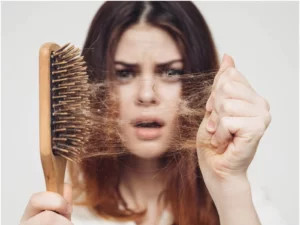- Androgenetic Alopecia: Commonly known as male pattern hair loss and female pattern hair loss, this condition is mostly hereditary and environmental, but can be managed through medication or surgery. This is the most common type of hair loss and is recognized in approximately 95% of the cases of hair loss. The hormone dihydrotestosterone (DHT) is primarily responsible for this condition. In men, this condition is characterized by receding hairline at the temples and balding at the top of the head. In females, it is recognized through widening of the parting and a reduction is density and volume of the hair.
- Telogen Effluvium: This is characterized by hair thinning and hair loss all over the scalp. It occurs when large numbers of follicles on the scalp enter the resting phase of the hair growth cycle, called telogen, but the next growth phase doesn’t begin, causing hair to fall out all over the scalp without new hair growth. It is usually caused by a certain trigger factor which causes a major emotional or physical impact.
- Anagen Effluvium: This is a kind of rapid hair loss that results from a medical treatment, such as radiation or chemotherapy. The medications are responsible for shutting down hair follicle production in the scalp and other parts of the body. \
- Alopecia Areata: This is an autoimmune condition in which the body’s immune system attacks healthy tissues, including the hair follicles, resulting in loss of hair in patches. The onset of this condition is quite sudden and leads to rapid hair loss.
- Traction Alopecia: This is caused by pulling at the root of the hair and is the result of certain hairstyles that exert such a pull, like tight braids, ponytails, or hair buns. It is also caused due to the pulling of the hair because of clips and tight elastic bands.
- Scarring Alopecia: This results in permanent loss of hair caused by inflammatory skin conditions, such as cellulitis, folliculitis, acne, or other skin disorders, which often result in scars and destroy the ability of the hair to regenerate.
- Drug-induced Hair Loss: As the name suggests, this is caused by the use of certain medications such as cholesterol-lowering drugs, blood thinners, oral contraceptives, and medication used to treat gout.
- Trichotillomania: This is a psychological disorder, often seen in children, in which they deliberately pull out their hair. This is difficult to stop but can be treated through psychotherapy. Once the behaviour is stopped, the lost hair returns.
Should I Consult A Doctor?
If you are experiencing hair loss, it is always advisable to consult your doctor. La Midas provides the best hair loss treatment in Gurgaon. We prioritize the beauty and wellness of our clients, and with our cutting-edge technology, we always strive to achieve the best results. With our team of highly qualified and experienced specialists, and international standards of technology, infrastructure, clinical care and modern medicines, we help our patients achieve all their dreams of beauty and wellness.
Book an appointment with us now!



